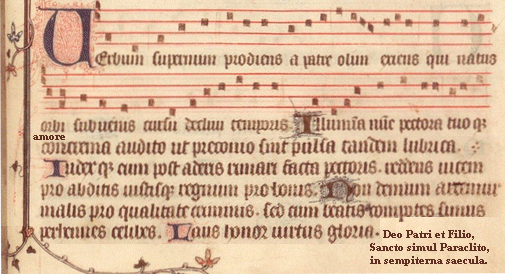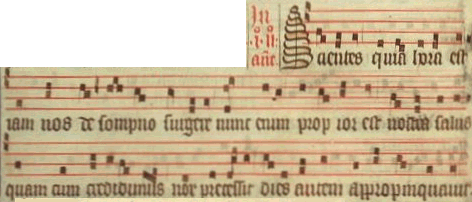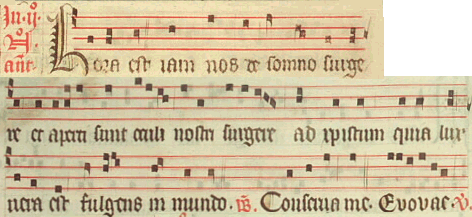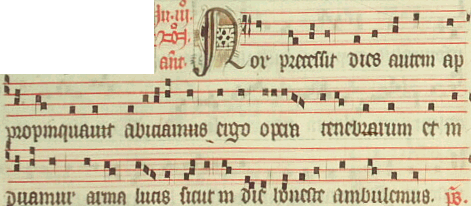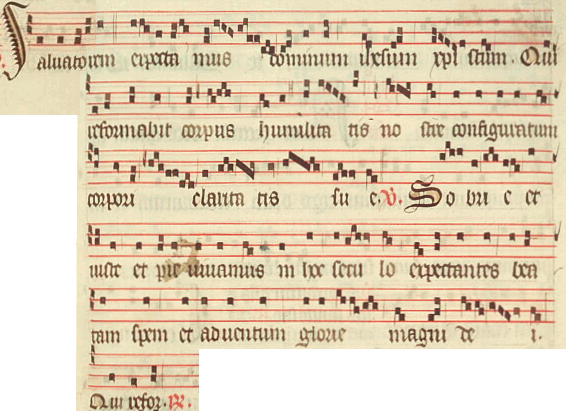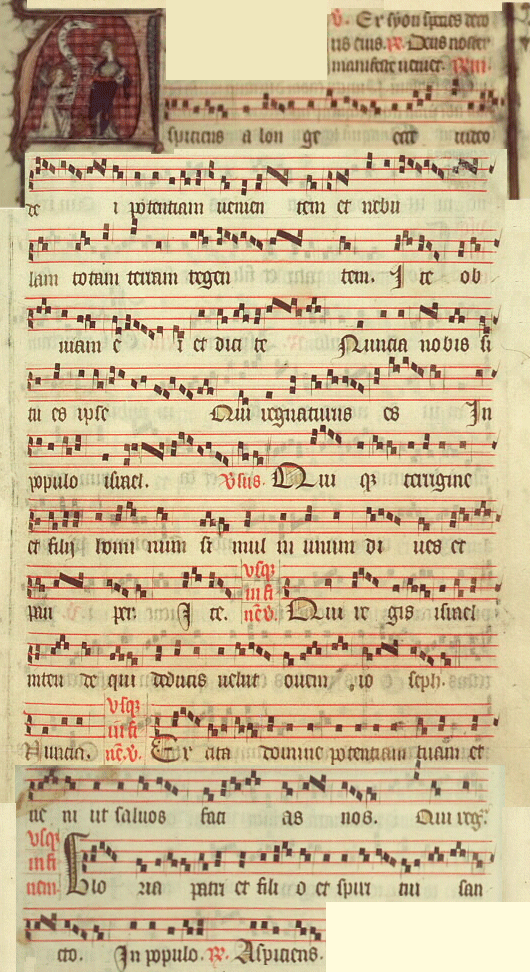Even Years: Cyril of Jerusalem, Catechetical Lecture 15 (PG 33, 870-874)
| Χριστοῦ
παρουσίαν καταγγέλλομεν
οὐ μίαν μόνον, ἀλλὰ
καὶ δευτέραν τῆς
προτέρας πολὺ
καλλίονα. ἡ μὲν
γὰρ ὑπομονῆς
εἶχεν ἐπίδειξιν,
ἡ δὲ θείας βασιλείας
φέρει τὸ διάδημα.
ὡς γὰρ ἐπὶ
τὸ πλεῖστον πάντα
διπλᾶ παρὰ τῷ
κυρίῳ ἡμῶν Ἰησοῦ Χριστῷ.
διπλῆ γέννησις, μία
ἐκ θεοῦ πρὸ
τῶν αἰώνων,
καὶ μία ἐκ παρθένου
ἐπὶ συντελείᾳ τῶν αἰώνων.
διπλαῖ αἱ
κάθοδοι, μία
ἡ ἀσυμφανής,
ἡ ὡς ἐπὶ πόκον, καὶ
δευτέρα ἡ ἐπιφανής,
ἡ μέλλουσα. ἐν
τῇ προτέρᾳ
παρουσίᾳ ἐσπαργανώθη
ἐν τῇ φάτνῃ,
ἐν τῇ δευτέρᾳ
ἀναβάλλεται
φῶς ὡς ἱμάτιον. ἐν τῇ
προτέρᾳ ὑπέμεινε σταυρόν,
αἰσχύνης καταφρονήσας,
ἐν τῇ δευτέρα
ἔρχεται ὑπὸ
στρατιᾶς ἀγγέλων
δορυφορούμενος,
δοξαζόμενος.
οὐχ ἱστάμεθα τοίνυν
ἐπὶ τῇ πρώτῃ
παρουσίᾳ μόνον,
ἀλλὰ καὶ
τὴν δευτέραν
προσδοκῶμεν. καὶ
ἐν τῇ προτέρᾳ
μὲν εἰπόντες
εὐλογημένος
ὁ ἐρχόμενος
ἐν ὀνόματι κυρίου,
καὶ ἐν τῇ δευτέρᾳ
ἐροῦμεν πάλιν
τὸ αὐτό, ἵνα μετὰ
ἀγγέλων συναντήσαντες
τῷ δεσπότῃ
προσκυνοῦντες
εἴπωμεν εὐλογημένος
ὁ ἐρχόμενος
ἐν ὀνόματι κυρίου.
ἔρχεται ὁ
σωτὴρ οὐ δικασθῆναι
πάλιν, ἀλλὰ
δικάσαι τοὺς
δικάσαντας. ὁ
πρότερον ἐν
τῷ κρίνεσθαι
σιωπήσας ὑπομιμνήσκων
λέγει τοῖς
παρανόμοις τοῖς
τὰ τολμηρὰ
ἐπὶ τοῦ σταυροῦ
πεποιηκόσιν· ταῦτα
ἐποίησας καὶ
ἐσίγησα. δι' οἰκονομίαν
τότε ἦλθε, σὺν
πειθοῖ διδάσκων
ἀνθρώπους, τότε
δὲ καὶ ἀνάγκῃ
βασιλευθήσονται
κἂν μὴ θέλωσιν.
| We preach not one coming only of Christ, but a second also, far more glorious than the first. The first revealed the meaning of his patient endurance; the second brings with it the crown of the divine kingdom.
Generally speaking, everything that concerns our Lord Jesus Christ is twofold. His birth is twofold: one, of God before time began; the other, of the Virgin in the fullness of time. His descent is twofold: one, unperceived, like dew falling on the fleece; the other, before the eyes of all, is yet to happen. In his first coming he was wrapped in swaddling clothes in the manger. In his second coming he is clothed with light as with a garment. In his first coming he bore the cross, despising its shame; he will come a second time in glory accompanied by the hosts of angels.
It is not enough for us, then, to be content with his first coming; we must wait in hope of his second coming. What we said at his first coming, Blessed is he who comes in the name of the Lord, we shall repeat at his last coming. Running out with the angels to meet the Master we shall cry out in adoration, Blessed is he who comes in the name of the Lord. The Saviour will come not to be judged again but to call to judgement those who called him to judgement. He who was silent when he was first judged, will indict the malefactors who dared to perpetrate the outrage of the cross, and say, These things you did and I was silent. He first came in the order of divine providence to teach men by gentle persuasion; but when he comes again they will, whether they wish it or not, be subjected to his kingship.
| | Καὶ περὶ
τῶν δύο τούτων
παρουσιῶν λέγει
Μαλαχίας ὁ
προφήτης· καὶ ἐξαίφνης
ἥξει εἰς τὸν ναὸν
αὐτοῦ κύριος, ὃν
ὑμεῖς ζητεῖτε. ἰδοὺ
μία παρουσία.
καὶ πάλιν περὶ
τῆς δευτέρας
παρουσίας φησίν·
καὶ ὁ ἄγγελος τῆς
διαθήκης, ὃν ὑμεῖς
ζητεῖτε. ἰδοὺ ἔρχεται
κύριος
παντοκράτωρ.
καὶ τίς ὑπομενεῖ
ἡμέραν εἰσόδου
αὐτοῦ; ἢ τίς ὑποστήσεται
ἐν τῇ ὀπτασίᾳ
αὐτοῦ; διότι αὐτὸς
εἰσπορεύεται ὡς
πῦρ χωνευτηρίου
καὶ ὡς πόα πλυνόντων.
καὶ καθιεῖται
χωνεύων καὶ
καθαρίζων. καὶ ἑξῆς
εὐθὺς ὁ σωτήρ
φησιν αὐτός·
καὶ προσάξω πρὸς
ὑμᾶς ἐν κρίσει,
καὶ ἔσομαι μάρτυς
ταχὺς ἐπὶ τοὺς
φαρμακοὺς καὶ
καὶ ἐπὶ τὰς
μοιχαλίδας καὶ
ἐπὶ τοὺς ὀμνύοντας
τῷ ὀνόματί μου ἐπὶ
ψεύδει, καὶ τὰ ἑξῆς.
διὰ τοῦτο
προασφαλιζόμενος
ἡμᾶς ὁ Παῦλός
φησιν· εἴ τις ἐποικοδομεῖ
ἐπὶ τὸν θεμέλιον
τοῦτον χρυσὸν
καὶ ἄργυρον καὶ
λίθους τιμίους,
ξύλα, χόρτον,
καλάμην, ἑκάστου
τὸ ἔργον φανερὸν
γενήσεται· ἡ γὰρ
ἡμέρα δηλώσει, ὅτι
ἐν πυρὶ ἀποκαλύπτεται.
Ἤδη καὶ ὁ Παῦλος
τὰς δύο παρουσίας
ταύτας σημαίνει
γράφων πρὸς Τίτον
καὶ λέγων· ἐπεφάνη
ἡ χάρις τοῦ θεοῦ
τοῦ σωτῆρος πᾶσιν
ἀνθρώποις,
παιδεύουσα ἡμᾶς,
ἵνα ἀρνησάμενοι
τὴν ἀσέβειαν
καὶ τὰς κοσμικὰς
ἐπιθυμίας
σωφρόνως καὶ εὐσεβῶς
καὶ δικαίως ζήσωμεν
ἐν τῷ νῦν αἰῶνι,
προσδεχόμενοι
τὴν μακαρίαν ἐλπίδα
καὶ ἐπιφάνειαν
τῆς δόξης τοῦ
μεγάλου θεοῦ
καὶ σωτῆρος ἡμῶν
Ἰησοῦ Χριστοῦ.
βλέπεις ὅπως εἶπε
πρώτην μὲν ἐφ' ᾗ
εὐχαριστεῖ,
δευτέραν δὲ ἣν
προσδοκῶμεν;
διὰ τοῦτο καὶ τὰ
τῆς πίστεως τῆς
ἐπαγγελλομένης
ὑφ' ἡμῶν νῦν οὕτως
παρεδόθη,
πιστεύειν εἰς
τὸν καὶ ἀνελθόντα
εἰς τοὺς οὐρανοὺς
καὶ καθίσαντα ἐκ
δεξιῶν τοῦ
πατρός, καὶ ἐρχόμενον
ἐν δόξῃ κρῖναι
ζῶντας καὶ
νεκρούς, οὗ τῆς
βασιλείας οὐκ ἔσται
τέλος.
| The prophet Malachi has something to say about each of these comings. The Lord whom you seek will suddenly come to his temple. That is the first coming. Again, of the second coming he says, And the angel of the covenant whom you seek. Behold, the Lord almighty will come: but who can endure the day of his coming, and who can stand when he appears? For he is like a refiner's fire and like fuller's soap; he will sit like a refiner and a purifier. [Then our Savior himself goes on to say (Mal 3:5): I am coming to put you on trial and I shall be a ready witness against sorcerers, adulterers, perjurers," etc. Therefore Paul puts us on guard when he says: "Now if any one builds on the foundation with gold, silver, precious stones, wood, hay, or straw, the work of each will come to light, for the Day will disclose it. It will be revealed with fire, and the fire will test the quality of each one's work" (1 Cor 3:12-13).] Paul pointed to the two comings when he wrote to Titus, The grace of God has appeared for the salvation of all men, training us to renounce irreligion and worldly passions, and to live sober, upright, and godly lives in this world, awaiting our blessed hope, the appearing of the glory of our great God and Saviour Jesus Christ. You see how he has spoken of the first coming for which he gives thanks and of the second to which we look forward.
Hence it is that by the faith we profess, which has just been handed on to you, we believe in him 'who ascended into heaven and took his seat at the right hand of the Father. He will come again in glory to judge the living and the dead; and his kingdom will have no end.'
|
Odd Years: Aelred of Rievelaux, Sermon 1, Advent
| Vos debetis scire, fratres carissimi, quia hoc tempus beatum, quod nos uocamus Aduentum Domini, repraesentat nobis duo quaedam, et ideo de duabus rebus debet esse gaudium nostrum, quia et duplex nobis debet conferre commodum.
| The present holy season which we call Advent directs our thoughts to our Lord's twofold coming. We have therefore a double reason for rejoicing because we are meant to derive from it a double benefit.
| | Repraesentat nobis hoc tempus utrumque aduentum Domini nostri: et illum scilicet dulcissimum aduentum quo ille speciosus forma prae filiis hominum, ille desideratus cunctis gentibus, Dei scilicet Filius, diu exspectatam et ab omnibus patribus ardenter [desideratam], huic mundo suam uisibilem in carne exhibuit praesentiam, id est quando uenit in hunc mundum peccatores saluos facere; et illum nihilominus a nobis solida spe exspectandum et utique cum lacrimis saepius recolendum quo idem Dominus noster, qui prius in carne uenit occultus, ueniet in gloria sua manifestus—sicut canitur de eo in psalmo: Deus manifeste ueniet, et cetera—, id est in die iudicii, quando ueniet manifestus iudicare.
| Advent calls to mind the two comings of our Lord: first the coming of the fairest of the sons of men and the desire of all nations, so long awaited and so fervently prayed for by all the fathers when the Son of God graciously revealed to the world his visible presence in the flesh, that is to say when he came into the world to save sinners; the other that second coming to which we look forward no less than did our fathers of old. While we await his return our hope is sure and firm, yet we also frequently remind ourselves with tears of the day when he who first came to us concealed in our flesh will come again revealed in the glory which belongs to him as Lord. Of that day the psalmist sings: God will come openly; it is the Day of Judgment when Christ will come as judge in the sight of all.
| Primus namque aduentus eius perpaucis iustis innotuit. In secundo suo aduentu et iustis et reprobis manifeste apparebit, propheta id apertius insinuante qui ait: Et uidebit omnis caro salutare Dei. Sed tamen proprie, sicut dies ille quem debemus celebrare paulo post in memoriam natiuitatis illius repraesentat natum, id est plus expresse signat illum diem et horam quando uenit in hunc mundum, ita istud tempus quod celebramus ante illum diem repraesentat illum desideratum, id est illud desiderium quod habebant sancti patres qui fuerunt ante eius aduentum.
| Our Lord's first coming was indeed known only to a small number of good people, but his second will be evident to good and bad alike, as is known to us by the prophet's announcement: All flesh will see the salvation of God.
To speak more precisely, however, the day we are shortly to celebrate in memory of our Lord's birth brings him before us as a newborn child, that is to say it more expressly signifies the day and the hour when he first came into the world, whereas the season we keep beforehand represents him to us as the longed-for Messiah and reminds us of the yearning that filled the hearts of those holy fathers of ours who lived before his coming.
| | Pulchre ergo in Ecclesia prouisum est ut hoc tempore eorum uerba recitarentur eorum que desideria recolarentur qui primum Domini praecesserunt aduentum. Nec hoc desiderium illorum celebramus uno tantum die, sed quasi longo tempore, quia hoc solet euenire, ut quod multum desideramus, si aliquo tempore differatur, uideatur nobis dulcius quando uenerit hoc quod amatur. Nostrum est ergo, fratres carissimi, sanctorum patrum exempla sectari eorum que desideria recolere, et sic mentes nostras in amorem et desiderium Christi accendere.
| How beautifully then at this season the Church provides that we should recite the words and recall the longing of those who lived before our Lord's first advent! Nor do we commemorate that desire of theirs for a single day, but share it so to speak for a long period of time, because when something we greatly love and long for is deferred for a while it usually seems sweeter to us when it does arrive.
It is our duty then to follow the example and recall the longing of the holy fathers and so inflame our own souls with love and longing for Christ.
| | Debetis ergo scire quod propter illam causam nobis institutum est celebrare hoc tempus, ut debeamus attendere desiderium quod sancti patres nostri habuerunt de primo aduentu Domini nostri, et per exemplum illorum discamus habere magnum desiderium de secundo illius aduentu. Debemus considerare quae bona nobis fecit Dominus noster per suum primum aduentum et quod faciet nobis multo maiora per secundum, et per istam considerationem illum primum aduentum illius multum amare et illum secundum multum desiderare.
| You must understand that the reason why this season was instituted was to inspire us to remember the desire of our holy fathers for our Lord's first coming, and through their example learn to have a great longing for the day when he will come again. We should consider how much good our Lord did us by his first coming, and how much more he will do for us by his second. This thought will help us to have a great love for that first coming of his and a great longing for his return.
| | Et si non habemus tam bonam conscientiam ut audeamus desiderare aduentum eius, debemus saltem timere aduentum eius et per illum timorem a uitiis nostris nos corrigere, ut, si forte non poterimus hic non timere, saltem, quando uenerit, tunc non timeamus sed securi simus. Et reuera, fratres, qui modo sunt solliciti circa se ipsos et timent illum diem iudicii antequam ueniat, sine dubio tunc non timebunt quando uenerit.
| And if our conscience is not so perfect that we dare entertain such a desire, we ought at least to fear his second coming and by means of that fear to correct our faults, so that if perhaps we cannot help being afraid here and now, we shall at least be secure and fearless when he comes again. [And truely, brothers, those who look after themselves and fear that day of judgment before it comes, will no doubt not fear it when it does come.]
| |
| |

